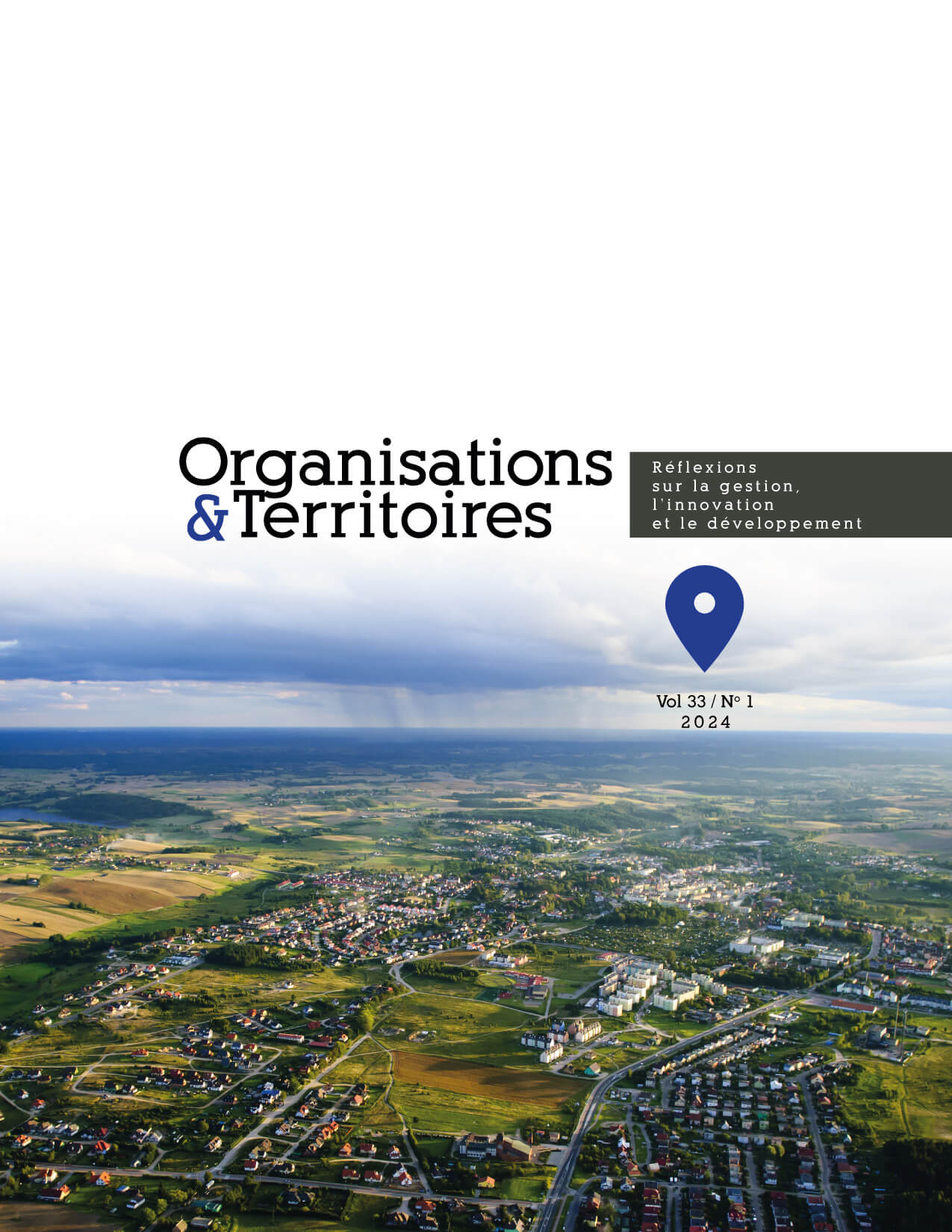L’ impact de la transition numérique sur l’entrepreneuriat informel des femmes commerçantes à Libreville au Gabon
DOI:
https://doi.org/10.1522/revueot.v33n1.1718Keywords:
Digital transition, female informal entrepreneurship, economic empowerment, challenges and opportunities, resilience and adaptation strategiesAbstract
This article explores the impact of the digital transition on informal female entrepreneurship in Libreville, Gabon, and on their economic empowerment. Using an exploratory qualitative approach and relying on semi-structured interviews with female merchants in Libreville as well as various stakeholders (NGOs, etc.), the study reveals that the digital transition offers opportunities, particularly in terms of access to information and financial services, and of the strengthening of social networks and human capital. However, it also highlights significant challenges, such as limited access to technology, inadequate digital skills, and the presence of restrictive social and cultural norms. Strategies for adaptation and resilience developed by the female merchants to overcome these obstacles are identified. These findings suggest directions for policymakers, managers, and organizations eager to support female entrepreneurship in the context of expanding digitization.
References
Aker, J. C. et Mbiti, I. M. (2010). Mobile phones and economic development in Africa. Journal of Economic Perspectives, 24(3), 207-232. https://doi.org/10.1257/jep.24.3.207
Braun, V. et Clarke, V. (2006). Using thematic analysis in psychology. Qualitative Research in Psychology, 3(2), 77-101. https://doi.org/10.1191/1478088706qp063oa
Brynjolfsson, E. et McAfee, A. (2014). The second machine age: Work, progress, and prosperity in a time of brilliant technologies. W. W. Norton & Company.
Buvinić, M. et Furst-Nichols, R. (2016). The business of empowerment: Women’s entrepreneurship as a catalyst for change. World Bank. https://doi.org/10.1093/wbro/lku013
Buvinić, M., Furst-Nichols, R. et Pryor, E. (2019). Digital financial inclusion: Lessons from Latin America. Center for Global Development.
Charmes, J. (2012). Informal sector and economic development: The institutional dynamics of street trade in the urban economy. Routledge.
Chen, M. A. (2012). The informal economy: Definitions, theories and policies [Working Paper No. 1]. WIEGO. https://www.wiego.org/sites/default/files/publications/files/Chen_WIEGO_WP1.pdf
Creswell, J. W. (2013). Research design: Qualitative, quantitative, and mixed methods approach. SAGE.
Denzin, N. K. (1978). Sociological methods: A sourcebook. McGraw-Hill.
DiCicco-Bloom, B. et Crabtree, B. F. (2006). The qualitative research interview. Medical Education, 40(4), 314-321. https://doi.org/10.1111/j.1365-2929.2006.02418.x
Donner, J. et Tellez, C. (2008). Mobile banking and economic development: Linking adoption, impact, and use. Asian Journal of Communication, 18(4), 318-332. http://www.informaworld.com/openurl?genre=article&issn=0129%2d2986&volume=18&issue=4&spage=318
GSMA. (2020a). The mobile economy: Sub-Saharan Africa 2020. https://www.gsma.com/mobileeconomy/sub-saharan-africa
GSMA. (2020b). The mobile gender gap report 2020. https://www.gsma.com/mobilefordevelopment/wp-content/uploads/2020/05/GSMA-The-Mobile-Gender-Gap-Report-2020.pdf
Hendricks, W. et Olawale, B. (2022, septembre). Bridging the gender-based digital divide: Empowerment of women through ICT. Actes du 10e Pan-Commonwealth Forum on Open Learning (PCF10) (p. 9136). Calgary (Canada). https://doi.org/10.56059/pcf10.9136
Hilbert, M. (2011). Digital gender divide or technologically empowered women in developing countries? A typical case of lies, damned lies, and statistics. Women’s Studies International Forum, 34(6), 479-489. https://doi.org/10.1016/j.wsif.2011.07.002
Jack, W. et Suri, T. (2014). Risk sharing and transactions costs: Evidence from Kenya’s mobile money revolution. American Economic Review, 104(1), 183-223. https://doi.org/10.1257/aer.104.1.183
Kabeer, N. (2001). Resources, agency, achievements: Reflections on the measurement of women’s empowerment. Development and Change, 32(3), 435-464. https://doi.org/10.1111/1467-7660.00217
Mensah, J., Asante, S. K. et Asamoah, F. (2020a). Women’s participation in the digital economy: A review of the litera-ture. Information Development, 36(1), 36-47. https://doi.org/10.1177/0266666920911276
Mensah, J., Ezeanya, C. et Owusu-Addo, E. (2020b). Gendered digital divides and rural livelihoods: A study of women traders in Ghana and South Africa. The Journal of Development Studies, 56(11), 2088-2105.
Mensah, J., Osei-Kojo, A. et Boateng, R. (2020c). Digital inclusion, gender, and poverty in Ghana. Gender, Technology and Development, 24(2), 111-133.
Mensah, J., Osei-Mensah, J. et Duodu, E. A. (2020d). Women’s participation in the digital economy in Ghana: Barriers, opportunities and policy implications. Gender, Technology and Development, 24(2), 139-160.
Meunier, F., Krylova, Y. et Ramalho, R. (2017). Women’s entrepreneurship: How to measure the gap between new female and male entrepreneurs? [Policy Research Working Papers]. World Bank. https://doi.org/10.1596/1813-9450-8242
Miles, M. B. et Huberman, A. M. (1994). Qualitative data analysis: An expanded sourcebook. SAGE.
Nussbaum, M. C. (2000). Women and human development: The capabilities approach. Cambridge University Press.
Omwansa, T. K. et Sullivan, C. (2012). Mobile phones and economic development in Africa: A review of the literature. Journal of Economic Surveys, 28(2), 330-346. https://doi.org/10.1111/j.1467-6419.2011.00714.x
République gabonaise. (2018). Gabon digital 2025 : stratégie nationale pour la transformation digitale de l’économie et de la société.
Saldaña, J. (2015). The coding manual for qualitative researchers. SAGE.
Sen, A. (1999). Development as freedom. Oxford University Press.
United Nations Conference on Trade and Development (UNCTAD). (2019). Digital Economy Report 2019 – Value creation and capture: Implications for developing countries. https://unctad.org/webflyer/digital-economy-report-2019
World Bank. (2019a). The world development report 2019: The changing nature of work. World Bank Group. https://www.worldbank.org/en/publication/wdr2019
World Bank. (2019b). Unlocking the potential of digital trade in Africa: A framework for action. International Bank for Recon-struction and Development/World Bank Group.
World Bank. (2019c). Women and the web: Closing the internet gender gap. World Bank Group.
World Bank. (2019d). Women, business and the law 2019. World Bank Group.
Yin, R. K. (2017). Case study research and applications: Design and methods. SAGE.
Downloads
Published
How to Cite
Issue
Section
License
Copyright (c) 2024 Serge Francis Simen, Ursule Nudy Banzoussi Niaka, Yao Agbeno, Mireille-Laure Beyala Mvindi, Steve Paterne Nkoulou

This work is licensed under a Creative Commons Attribution-NonCommercial 4.0 International License.



